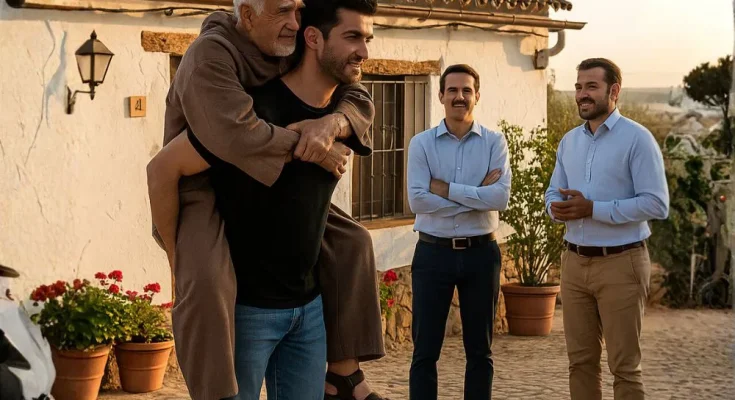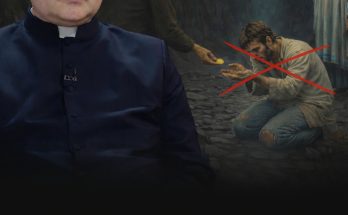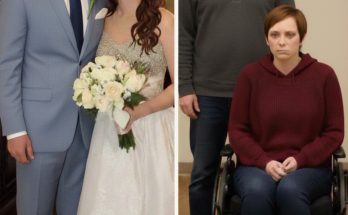The sun was setting behind the hills of Quezon City when Father Ramón slowly stepped through the door of his modest family home. The once-strong man, who had worked for decades as a carpenter and community builder, now looked frail after weeks in the hospital. His three sons—Rico, Julius, and Miguel—gathered around the table, anxious and unsure of what their father was about to say.
With trembling hands, Ramón laid a folded piece of paper on the table. His voice, though soft, carried a deep weight.
“My sons,” he began, “this is a promissory note for 900,000 pesos. I borrowed it to pay for my medical treatment. I can no longer work to repay it… and I need one of you to help me.”
A long silence filled the room. The ticking clock was the only sound that broke the air.
Rico, the eldest, looked away and cleared his throat. “Dad, I wish I could, but my daughter’s tuition in Manila is due next week. Things are tight.”
Julius rubbed the back of his neck, avoiding his father’s gaze. “I just opened my shop, Dad. I barely have enough capital to keep it going. Maybe Miguel can help.”
All eyes turned to the youngest, Miguel. He was only 28—an honest man with calloused hands from working long days in construction. He stared at the paper, then at his father’s weary face. He remembered the days when Ramón carried him on his shoulders, teaching him how to build things, how to fix what was broken, how to live with integrity.
After a pause, Miguel took a deep breath.
“I’ll pay it, Father,” he said firmly.
Ramón’s eyes widened. “Are you sure, son? You have your own debts—your house, your wife, and little expenses. I can’t ask you to do that.”
Miguel smiled faintly. “You don’t have to ask. You’ve already given me everything. I can always earn money again, but I can’t earn another father.”
For a moment, no one spoke. Then the old man’s eyes softened, and tears welled up. He reached for Miguel’s hand and whispered, “Thank you, my son.”
A Year of Hard Work and Quiet Sacrifice
From that day forward, Father Ramón moved in with Miguel and his wife, Anna, in their small home near Quezon Avenue. The house wasn’t much—two bedrooms, one bathroom, and a tiny yard—but it was filled with warmth.
Miguel worked double shifts to keep his promise. During the day, he labored on construction sites, mixing cement under the heat of the sun. At night, he drove delivery trucks, hauling boxes across the city until dawn. His hands were blistered, his body weary, but his heart stayed strong.
Anna, seeing her husband’s exhaustion, decided to help. She sold her old motorcycle—the one she used for work—and started a tiny café on the corner of their street. She called it “Ramón’s Brew,” in honor of her father-in-law, who loved making coffee for the neighbors. Each day, she prepared simple meals and brewed coffee with a smile, even when her body ached from the long hours.
Despite his age, Father Ramón refused to stay idle. Every morning, he swept the yard, watered the plants, and cooked porridge for breakfast. He often sat by the window, watching his son leave for work before sunrise.
Sometimes he would whisper to himself, “He reminds me so much of his mother—quiet, strong, and kind.”
At night, when Miguel returned home, they would sit together on the porch, sharing stories over a cup of tea. They rarely talked about money. They talked about life, about faith, and about gratitude. Those simple conversations became the highlight of Ramón’s final years.
The Day Everything Changed
A year passed. The rainy season had just begun when, one quiet July morning, Ramón called Miguel into his room. His breathing was slow, and his eyes looked distant, as though they carried the weight of something important.
“Sit down, son,” he said softly.
Miguel sat beside him, worried. “What’s wrong, Father? Are you feeling sick again?”
The old man smiled gently and reached for the drawer beside his bed. From it, he took a folded A4 paper—yellowed with time—and handed it to his son.
“Read this,” he whispered.
Miguel unfolded the paper. His heart began to race as his eyes scanned the words. It wasn’t a promissory note. It was a land title—a 500-square-meter property in Antipolo, registered under the name Miguel R. Dela Cruz.
“Father… what is this?” he asked, his voice trembling.
Ramón smiled faintly. “That land is yours, son. I bought it twenty years ago. When you agreed to help me pay the ‘debt,’ I transferred it to your name.”
Miguel looked confused. “But the 900,000 pesos—”
“It wasn’t real,” Ramón said, his voice breaking. “There was no loan. I wanted to see which of my sons understood what true wealth means. Rico and Julius chose comfort—and I don’t blame them. But you, Miguel… you chose love over money. That was the real test.”
Tears filled Miguel’s eyes as he clutched the paper to his chest. “I never wanted anything in return, Father. I just wanted you to be okay.”
Ramón reached for his son’s hand, his fingers frail and cool. “I know, son. That’s why you deserve it.”
He paused, his voice barely a whisper.
“Remember this, Miguel: you can always earn money again. But love—once lost—can never return.”
Miguel cried silently. The months of exhaustion, the nights of worry, the sacrifices—all of it suddenly made sense. His father’s lesson wasn’t about money. It was about heart.
The Richest Inheritance
A few months later, Father Ramón passed away peacefully in his sleep. The family buried him on a hillside overlooking the city he had helped build. On his altar at home, beside his photo, lay the land title—still slightly wrinkled, but shining under the candlelight.
Miguel couldn’t bring himself to sell the land. Instead, he and Anna decided to honor his father’s memory. They used their savings to build a small, simple house on the property and named it Casa Ramón.
At first, it was just a weekend getaway—a quiet place to rest and reflect. But soon, Miguel realized it could be more than that. Remembering his father’s generosity, he decided to turn Casa Ramón into a community training center. There, he taught young men and women basic carpentry, construction, and repair skills for free—just as his father had once taught him.
Every wall of the small house carried a story: the wooden beams, the hand-painted signs, and the garden his father once dreamed of tending. Children would come by after school, curious to learn, and Miguel would tell them stories about a man who valued kindness more than wealth.
Over time, Casa Ramón became a symbol in their neighborhood—a reminder that even small acts of love can change generations.
The True Measure of Wealth
Years passed, and Miguel’s own children grew up hearing their grandfather’s story. Whenever someone asked why he worked so hard, Miguel would smile and say:
“Because my father taught me that the greatest treasure a man can have is not in his bank account, but in his heart.”
He kept the old 900,000-peso “debt note” framed on the wall of Casa Ramón, beside a photo of him and his father sitting on the porch. It served as a daily reminder that life’s real tests often come disguised as struggles—and that love, not money, is what endures.
Visitors who came to Casa Ramón would often pause before that frame. Many left in tears, inspired by the quiet wisdom of a father and the unwavering love of a son.
A Legacy of Love and Gratitude
Today, Casa Ramón stands not just as a home, but as a living story of faith, humility, and gratitude. Under its roof, countless young people have learned skills that helped them find jobs, support their families, and rebuild their lives.
And every evening, as the sun sets over Antipolo, Miguel still sits on the porch—now a little older, with silver hair like his father once had—watching the next generation laugh and learn.
He often whispers the same words his father told him long ago:
“You can always earn money again. But love—once lost—can never return.”




